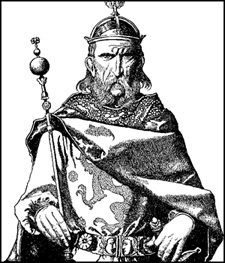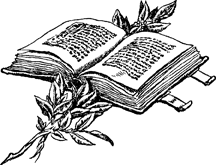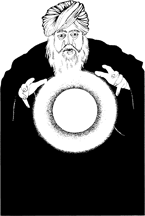
Hervé Carteau
What Is Wizardry?
Wizardry is the magic practised by the monotheist cultures of Western Genertela. Wizardry spells are the result of applying Reason and Logic to the World, of manipulating Matter and Energy in their Runic Forms. The Runes are the result of devolution of the All and are the highest concept that can be understood and acted upon by mere humans. Wizardry is a mixture of Art and Science. It is an intellectual field which is so large and offers so many possibilities that its students must specialize in studying only part of it.While there is a huge tradition that Western magic requires written texts to read, that is not about reading words: wizardry is about changing one's consciousness with the help of visual symbols. Technically, wizardry has little to do with faith and piety.
Where Does Wizardry Come From?

All wizardry originates from the work of the First Sorcerer, Zzabur, brother of Malkion. During the Fourth Action, Zzabur began studying the unbending Laws of the Universe and to manipulate matter and energy. He was the first to master the Magic Rune and began training others in his arts, eventually forming one of the six tribes of Danmalastan, the Enrovalini, to better study and develop Sorcery. In time, the six tribes organized the eight original schools of Sorcery, which still exist today. They developed more spells during the Fifth Action, in the Wars of Low Magics, when Zzabur fought off the elements and the emotions. Later, he federated all Sorcerers in the world to end the Ice Age and other catastrophes, developing High Magics.
At the Dawn, the eight original schools were greatly weakened. The Enrovalini became Brithini, led by Zzabur himself, strictly following the original laws of Malkion and keeping aloof of most humans. But whole parts of their population emigrated from their island of Brithos several times, settled in Akem (Fronela), Seshnela, etc. Most evolved as normal (mortal) human beings but kept venerating One God and using Sorcery. All Malkioni wizards are the heirs of Zzabur’s people and are often called Zzaburi.
There was much debate about which rules to follow for many centuries, until the Abiding Book was written by the Hand of God in Jrustela in 646. Most wizardry used today comes from the Abiding Book. The Abiding Book holds Magic which has been proven over a thousand years. It states the Laws of Malkion and tells how Creator became the Law, the Prophet, the Founder and the Person who died. It relates the survival stories of the Chosen of Malkion who upheld his faith and Laws against rivalry and doom. It holds many homilies, parables on the Life of Malkion and details proper rites to invoke Blessing and Curses. It also holds the core spells common to most Malkioni Churches, all cleverly hidden or coded.
The wizardry of the Abiding Book is within the text itself. Each character of the Western script corresponds to core Gloranthan runes. By studying the relationship each character of the Abiding Book has with every other character, a wizard can understand how the runes relate to each other and their permissible combinations. Thus studying of the Abiding Book is key to understanding and interpreting the Runes themselves.

The God Learners, wizards of the Second Age, used the Abiding Book purely as a tool to develop many more new spells. Some, the Zistorites, even went so far as to randomly recombine parts of it using machines to reach that goal. Because they did not respect the word of God, God punished them and Creation wiped them out. The original Abiding Book was lost when Jrustela sunk, and only copies of copies exist today.
All modern churches’ Holy Books are made of only incomplete parts, glosses and commentary of the original Abiding Book, some with added Spells (from older Brithini grimoires, Arkati tomes, or God Learner inventions). They are all written with the same alphabet and can be read by any literate westerners.
Who Practices Wizardry?
In western societies, all professional users of Wizardry are members of the Zzaburi caste (or their heirs), distinct from all others. Most are Wizards (or Mages), members of a School; itself belonging to a Church. They abide by the Laws of Malkion as defined by their Church. They only can learn spells validated by it. While piety may help them to cast spells more effectively, it is not a very important requirement. Their role is to “maintain the energetic well-being of their community” as Malkion Himself decreed.This includes protecting the community against all magical threats, advising Talari (rulers) on such matters, and making sure the Dronari (commoners) and Horali (soldiers) behave in ways that maintain and strengthen the community. While some occupy high positions in Church hierarchy, most Mages spend their time meditating on their Holy Book, practising exegesis and trying to understand God and His Creation through their Scriptures.
Schools of wizardry are common within most Churches. They are communities of Zzaburi gathered around noted teachers. These schools are often organized as a religious fellowship and founded by or dedicated to a Saint of the Church. Schools often have carefully ordered daily routines, community goods, and strict taboos on diet and clothing. These scholastic communities pursue an intellectual mission of understanding wizardry and the holy texts of the Church.
There also exist independent Schools of Wizardry, each with its founder, which do not belong to any church (but might have a long time ago). Their members are called Sorcerers. While they may have wider access to many spells, they are viewed with much distrust by established churches. Most also are much less well-funded or organized. They do not care about “the energetic well-being of the community” and focus on the quest of knowledge.
How Do Wizards and Sorcerers Work In Game Terms?
Wizardry students learn their spells from Grimoires, which are written materials, decoded extracts and comments from some parts of the Abiding Book or one of its many copies, versions or exegeses. Each Grimoire is an independent skill learned as such. Wizardry spells have specific, unchangeable effects. Nothing can be “improvised” from a sorcery spell: the Laws of nature make a spell work the same way all the time.Mages and Sorcerers have a “Comprehend Grimoire X” skill which allows them to cast all spells contained in this specific Grimoire at the same rating. Each +1 costs them 2 HP. They may also learn specific spells individually. Spells do not need physical support to cast, though Zzaburi can boost their skill using special components or by casting them in ritually prepared locations.
Wizardry spells are powered by energy drawn from the Essence Plane. Part of the ability to cast the spell is the direct channelling of this energy. Church Wizards also channel their congregations’ prayer energy. Sorcerers can Tap energy from the mundane world (including people), to its detriment, which makes them so feared.
Wizardry is a specific kind of Magic which is affected and/or affects other (theist / animist) magics at a penalty. Difficulty level is at least one level higher when attempting to dispel, perceive or understand these foreign magics (difficult becomes very difficult, etc).
Zzaburi all train in mastering Runic Sight (though this name may change from one school to another). This allows them to understand the underlying Runes in any being, place or object they examine. The higher the success the better the information gained. This can be used as an augment to understand a Grimoire or magic text.
How Do Malkioni Churches Work?
Malkionism is fundamentally urban in mindset. All members of Malkioni society are members of their city, be they the artisans who live and work within the walls of the city, or farmers who work the lands of the city and come to the city only for worship and special occasions (indeed both occupations belong to the same caste – the Dronari). Malkioni society is imagined as a Universal City, with each caste contributing to the well-being of the whole.

Malkioni churches are strict hierarchical affairs and organized from the top down. All members must follow the Laws of Malkion defined by the Church or risk anathema. Their structure was defined in the Abiding Book a thousand years ago and is the same for all of them. Here is the basic structure of a Malkioni Church:
- The Head of a Malkioni Church is the “Ecclesiarch”, also called Living Saint. He is the wisest and most learned among his peers, who elect him in conclave to this position when the former Ecclesiarch dies. He has the power and duty to steer the whole church and is the ultimate authority for all questions of dogma and religious justice. He can use the whole church’s community support to power his own spells in times of need, which makes him extremely powerful.
- The Saint is assisted by companions who are called “Judges” or “Watchers.” Each city has its Watcher who oversees the whole local church organization. He can also use the city’s community support to power his spells. “High Watchers” can be appointed by the Ecclesiarch to oversee Watchers in very big churches. Other Watchers are heads of wizardry schools or direct assistants to the Ecclesiarch. All Watchers and High Watchers are Zzaburi.
- Knowers are Wizards; learned Zzaburi who have mastered the Scriptures. They have access to most, if not all, the spells found in their Church’s Holy Text (usually an interpretation of the Abiding Book). Wizardry schools train the Zzaburi caste and provide learned guidance and interpretation as to the meaning of the Holy Texts of the Church. Most of these schools are under the supervision of a Watcher.
- The priests of the Malkioni churches are called “Readers”. Senior priests are called “High Readers”. Readers are not Zzaburi, but Talari, Horali, and Dronari who, in addition to their other duties, lead religious services for their own caste. While they may know a few sorcery spells, their main duty lies in the Reading of their Scriptures. These are select extracts of their Church’s Holy Book, chosen to educate each caste. Each weekly reading gives the attending members a Blessing to their caste activities (the Narrator may give a situational augment to heroes who have recently attended a Reading of the Scriptures). The Reader can also invoke specific blessings at ceremonies for marriages, funerals, births, etc. When appropriate, the Reader can use his community’s support as a bonus to his blessings.
- The clerks of the Church are called “Servants”. Important clerks are called “High Servants.” The servants of the Church assist the Watchers and make up the church’s bureaucracy. A few only are Zzaburi. Servants of a church may also be soldiers, spies, architects or any other profession that a Watcher deems worthy and useful to reach his goals.
Can Non-Zzaburi Use Magic Too?
In most Malkioni churches, Talari may learn Ruling Magic, Horali Fighting Magic, and Dronari learn magic appropriate to their work. These people recite Prayers to a saint - a limited type of spell that does not require literacy to obtain. Often the saint’s exploits are illuminated books or tapestries. These prayers are normally associated with a Malkioni Saint who is worshipped but not with sacrifice or personal devotion. Prayers to saints point towards an understanding of the Invisible God and provide wizardry of an unsophisticated sort. For example a prayer to St. Gerlant might function as a spell for Flaming Sword (using the Fire Rune). Most Churches strictly control access to spells by non-Zzaburi members.

In some cases, the list of the magical deeds of the Saint forms the basis of a Grimoire associated with him. In other cases, the founder of a school of wizardry is recognized as a Saint of a Church and his Grimoire is accorded holy status. Both of these schools are often called “Saintly Orders.”
Saint worship predates the Abiding Book and is wizardry, drawing its power from the Essence Plane. It is looked at with suspicion as “pseudo-paganism” by those who take a more fundamental approach to the Abiding Book such as the Rokari Church.
There are also some “hedge magicians” who learn spells orally and individually without the support of any Church. They are called by various names (witches, warlocks, etc.) and can be hermits, healers of a community or itinerary spell casters for hire.
In rules terms, non-Zzaburi must learn each prayer individually and augment at a cost of 1 HP per +1, a much higher cost than sorcerers or mages who augment their whole Grimoire by +1 for 2 HP, which is why they are more powerful magic users.
Gaming Opportunities
The above is a “bare bones” approach of game rules for western sorcery. It is how a Church should run, but humans are puny, ambitious and fractious creatures who like to get more out of life than God allowed them to.The richest and better-educated Dronari, such as merchants, can strive for access to sorcerous powers they are forbidden by their Church to even dream about.
Servants can and do actively jockey for “their” Watcher, whom they want to see promoted to higher responsibilities, and may come into conflict with the “stable” of another watcher.
Readers can gain access to more than their regular scriptures and earn sorcerous powers beyond their station. They might want to use them in contradiction to their Church’s credo.
Watchers and above are frequently vying for higher rank in their own church’s hierarchies, more to use the congregations’ prayer energy to further their goals (which might or might not be completely altruistic) than to get power and riches.
Each Church thinks the others misunderstand the True Laws and want to mend the others’ ways either by Reason or by the Sword. Some churches hate each other enough for their members to fight on sight. Any inter-church Council (Synod) is an extremely tense and complicated affair.

Independent Sorcery Schools are feared by most churches because they show that it’s possible to wield the highest magical power, Sorcery, without having to obey any church. Their members can also be powerful enough to defy church authorities. Some are useful for specific purposes, but most churches make sure their flock fear and distrust sorcerers, and use them as scapegoats in case of need.
Reactions to Pagans (theists) and Heathens (animists) vary for each church. Some see them as mere cattle for Tapping. Others forbid any contact with them, fearing spiritual pollution. Some want to actively bring them into the fold of Malkionism. A few actually integrate deities in their veneration, presenting them as Saints or aspects of Creator (henotheists).
Wizardry Elsewhere in Glorantha
Wizardry is practised in Carmania, the East Isles and Umathela: in all these places westerners settled down and brought wizardry with them, though their churches transformed into something else. The Lunar Empire also holds some strange Lunar magic that resembles wizardry but draws its power from the Moon and not the Essence Plane. The Kralori also know and practise their brand of Sorcery. Mostali do use energy derived from the Essence Plane to power their magics but with radically different techniques from the Malkioni. Finally, some uz practise sorcery taken from Arkat the man-troll.Other Cultures' Reactions to Wizardry
To most theists and animists, there is no difference between wizardry and sorcery. They think Godlearners’ excesses, has made “malks” very unpopular in every other culture. Only the most open-minded, cultured members of a pagan society would dare talk to a Malkioni without shooting first. In lands where many cultures interact, such as Wenelia, this reaction is less brutal but the old core of mistrust, fear, hate and jealousy remains.





